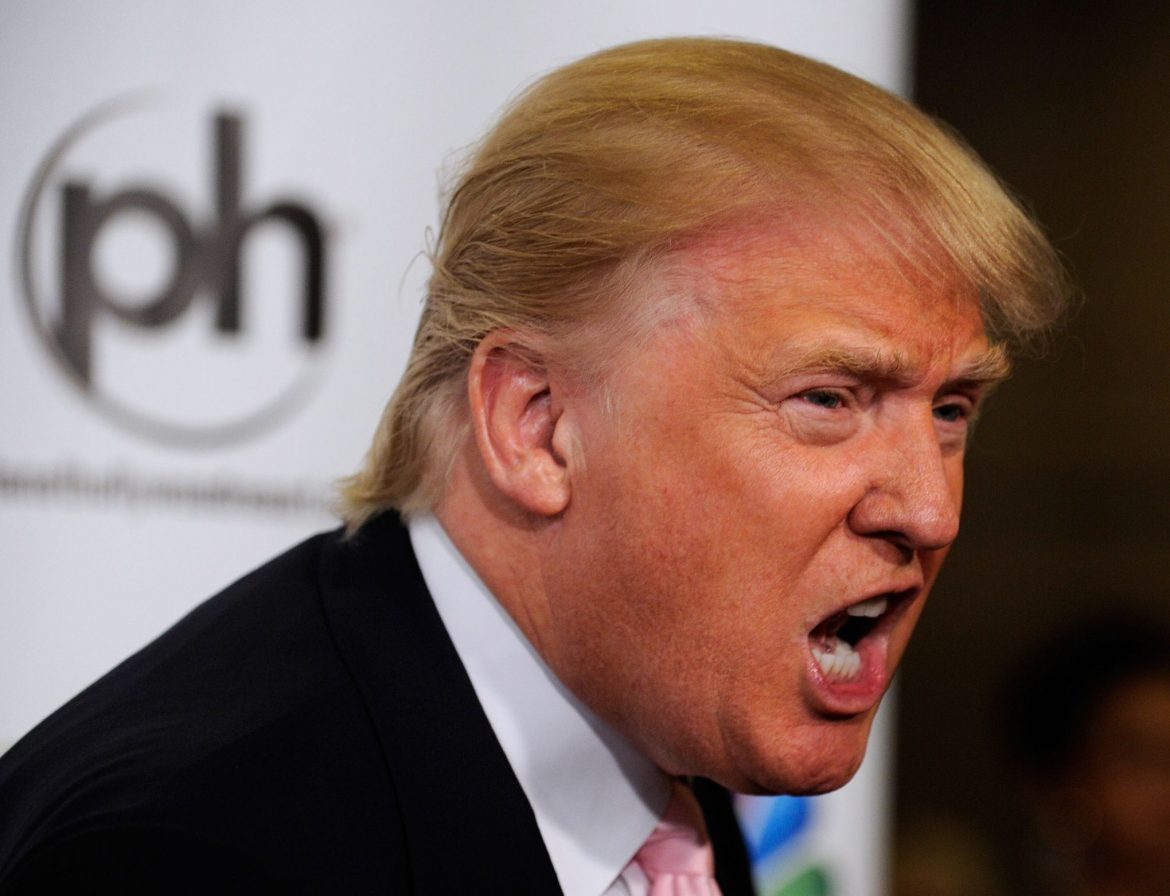The prospect of Donald Trump winning the race to the White House has joined China’s slowing economy, the Greek debt crisis and Britain’s EU referendum as a major threat to the global economy, according to a respected risk analysis firm.
The Economist Intelligence Unit said the Republican frontrunner could prove a dangerous world leader, damaging global trade, stirring up trouble with Beijing and adding to instability in the Middle East.
The EIU placed the possibility of Trump being sworn in as US president next January sixth on their latest list of global threats, as serious as a resurgence of jihadi terrorism, and only marginally less risky than the collapse of the eurozone.
The US property tycoon had been “exceptionally hostile towards free trade” during his campaign, and had advocated putting troops on the ground in Syria to fight Islamic State, the unit said.
“In the event of a Trump victory, his hostile attitude to free trade, and alienation of Mexico and China in particular, could escalate rapidly into a trade war – and at the least scupper the Trans-Pacific Partnership between the US and 11 other American and Asian states signed in February 2016.”
It added: “His militaristic tendencies towards the Middle East [and ban on all Muslim travel to the US] would be a potent recruitment tool for jihadi groups, increasing their threat both within the region and beyond.”
Trump is currently the favourite to win the Republican nomination, having stormed to success in Florida, Illinois, North Carolina and Missouri on Tuesday.
His bombastic campaign has both captivated and horrified many in America and beyond. In January, British MPs debated a petition to have him banned from the UK after he called for a “total and complete shutdown” on Muslims entering the US.
On Thursday, China’s party-controlled Global Times said the billionaire could herald a rising trend of protectionism and isolationism in the US.
“The rise of a racist in the US political area worries the whole world,” the newspaper said.
According to the EIU, there was “a moderate probability” of Trump winning November’s presidential election, and serious conflict in Washington if he succeeded.
“Although we do not expect Mr Trump to defeat his most likely Democratic contender, Hillary Clinton, there are risks to this forecast, especially in the event of a terrorist attack on US soil or a sudden economic downturn,” it said.
“It is worth noting that the innate hostility within the Republican hierarchy towards Mr Trump, combined with the inevitable virulent Democratic opposition, will see many of his more radical policies blocked in Congress – albeit such internal bickering will also undermine the coherence of domestic and foreign policymaking.”
A hard landing for the Chinese economy remains the biggest threat to the world economy, according to the EIU.
It said China’s manufacturing and service sectors were continuing to deteriorate, hampering the government’s efforts to tackle bad debts that had built up since the financial crisis. Recent plunges on the Shanghai stock market – down 17% so far this year – have undermined confidence in Beijing’s ability to manage the crisis.
If China’s economy slowed by more than currently expected, the EIU said it would have a “hugely detrimental impact” on emerging markets in Latin America, Africa and the Middle East, as well as a “severe knock-on effect” on Europe and the US.
There is also a “rising threat” of jihadi terrorism destabilising the global economy, the report said, citing recent attacks in Paris, Lebanon, Turkey, and Indonesia, and the downing of a Russian airliner over Egypt.
“The spread of IS [Isis] and its influence poses a dilemma for global policymakers, who are under pressure to intervene militarily to suppress the group in its strongholds in the Middle East [especially now that hundreds of thousands of Syrian refugees are seeking sanctuary in Europe], but which in turn would risk reprisals in their home countries by radicalised IS sympathisers.”
The long-term stability of the eurozone was also in doubt, according to the report. It said Greece’s future within the eurozone remained at risk if Athens failed to comply with the terms of its latest bailout. And if Greece left, other countries could follow, creating financial turmoil.
“Countries leaving the eurozone under duress would suffer large devaluations and be unable to service euro-denominated debts. In turn, banks would suffer huge losses in their sovereign bond portfolios, resulting in major disruption to the global financial system and plunging the world economy into recession,” the EIU said.
Talks between Greece and its creditors have been bogged down for months, delaying long-awaited negotiations on debt relief.
And Brexit, like Grexit, is another potential risk. The EIU said there was a low probability that Britain would vote to leave the EU in June, but there would be a high impact if it happened.
“If Britain did leave the EU it would have negative ramifications for the UK – still the fifth biggest economy in the world, and whose exporters would struggle in the face of regulatory and tariff uncertainty, and whose position as a leading global financial services hub would be imperilled.”
The EU would also suffer, given the UK is one of its fastest-growing members and a supporter of “trade and services liberalisation”, said the EIU. A British exit could also “exacerbate the ongoing global currency instability, notably in the west”.
Latest opinion polls have shown that the remain and leave campaigns are neck-and-neck, although Britain is odds-on to remain in the EU with the bookmakers.



